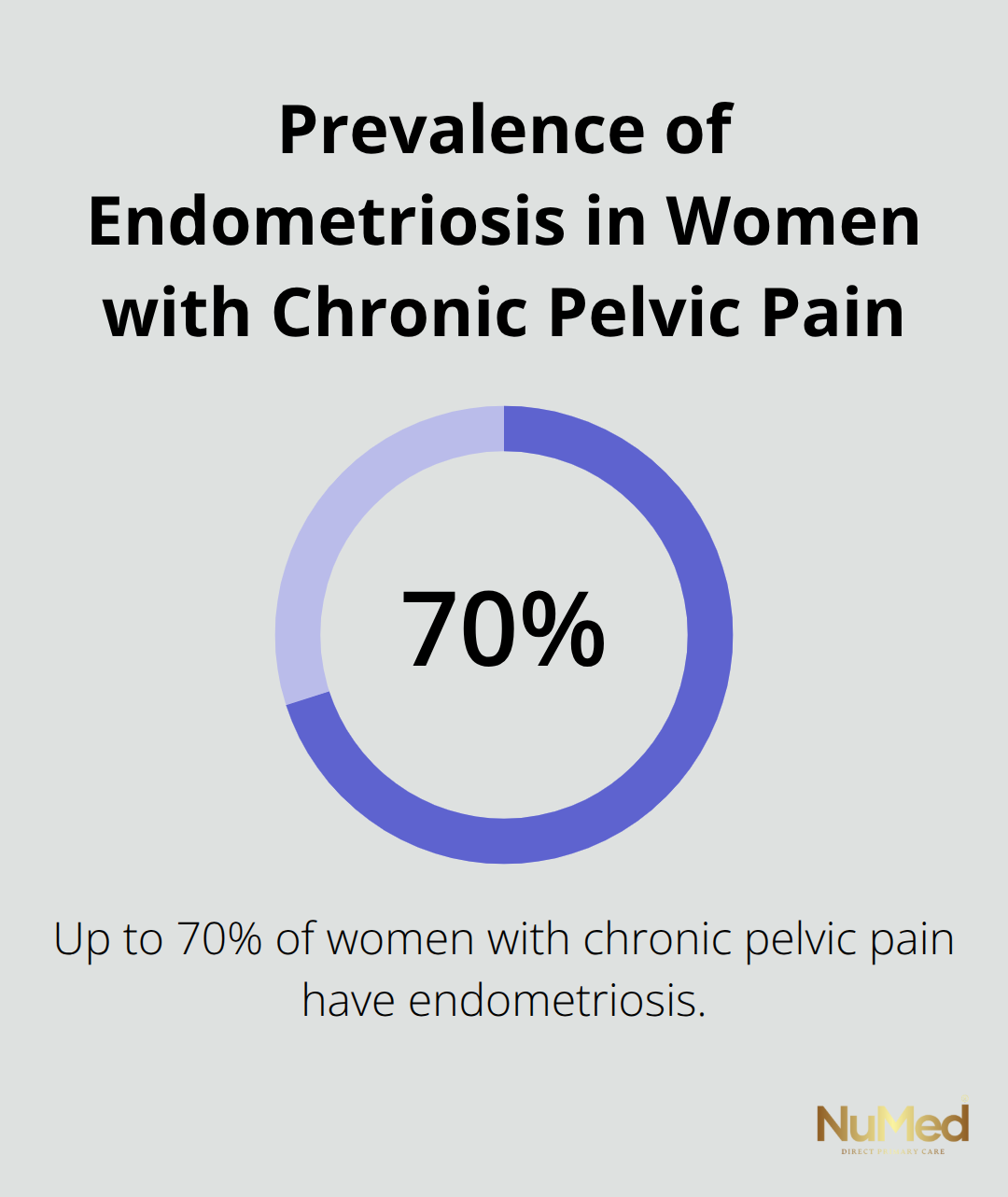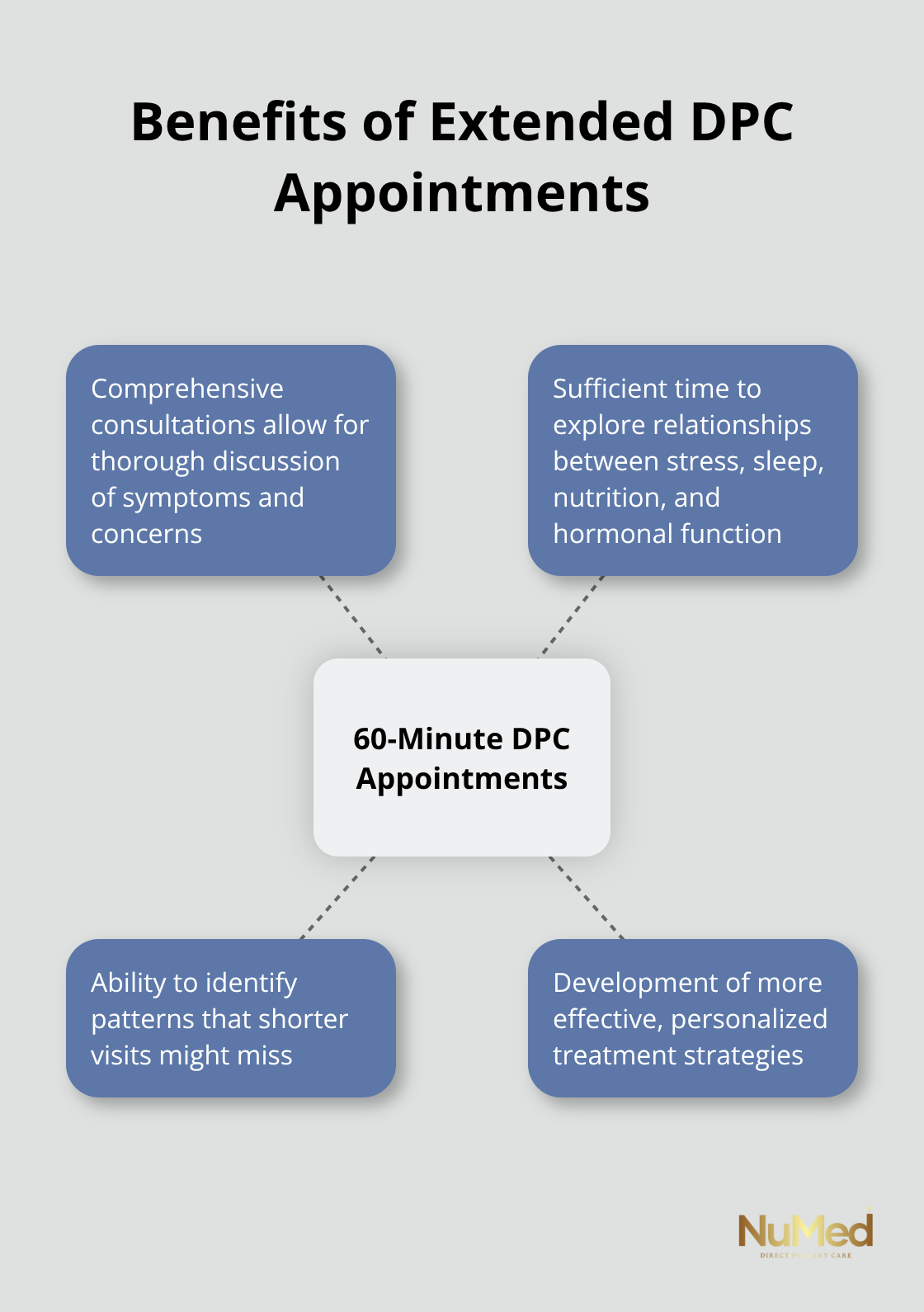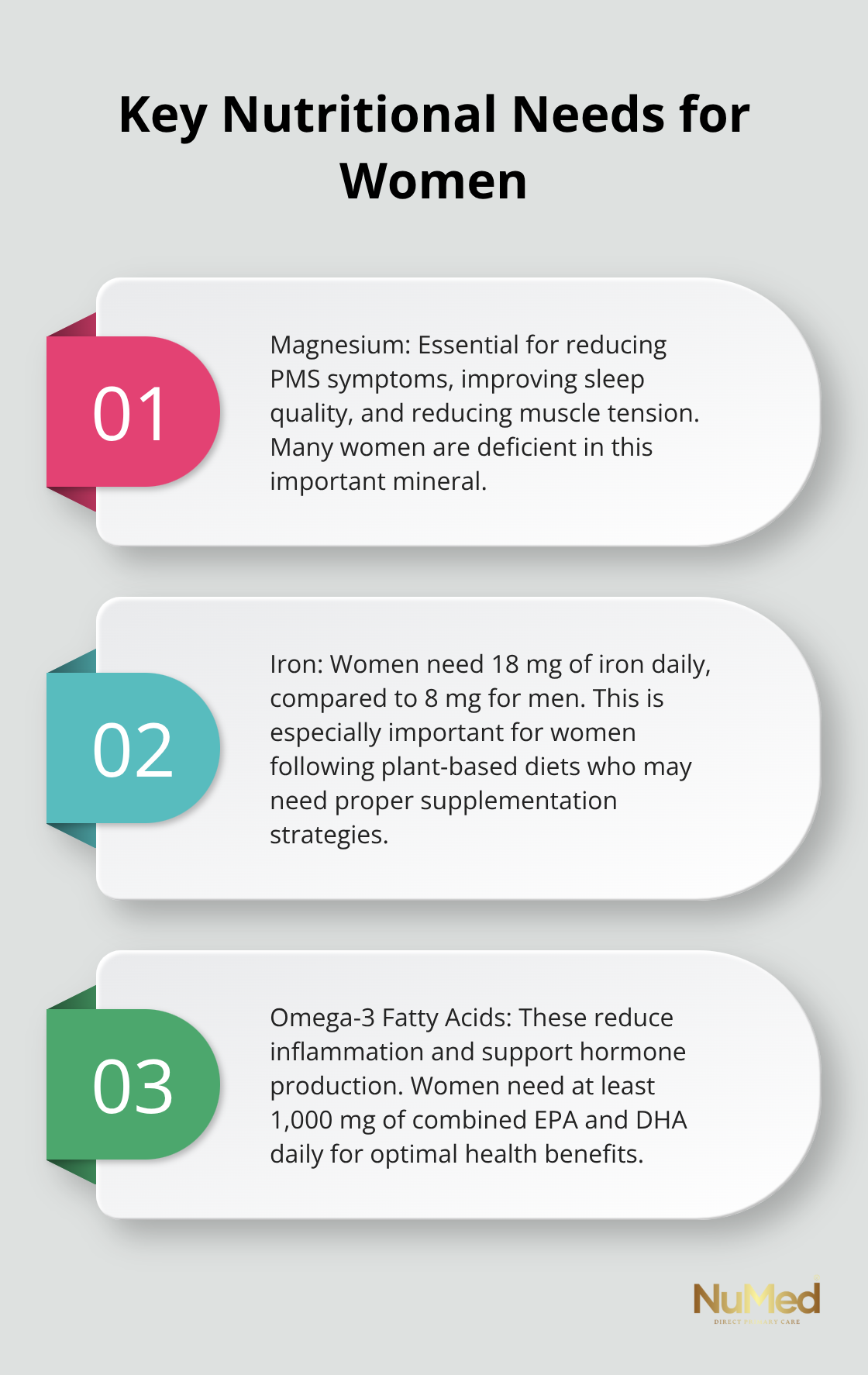Women’s health requires a personalized approach that goes beyond quick appointments and one-size-fits-all solutions. Traditional healthcare often fails to address the complex hormonal, physical, and emotional changes women experience throughout their lives.
At NuMed DPC, we provide the time and attention necessary to understand your unique health journey. Our comprehensive approach puts you in control of your wellness decisions.
Understanding Women’s Unique Health Needs
Women face distinct health challenges that require specialized attention throughout their lives. Estrogen levels shift dramatically during puberty, pregnancy, perimenopause, and menopause, and these changes affect everything from bone density to cardiovascular health. Menopause increases heart disease risk in women, requiring prevention through lifestyle, testing, and hormone replacement therapy to support long-term heart health. These shifts also impact sleep quality, mood regulation, and cognitive function in ways that standard healthcare often overlooks.
Hormonal Changes Throughout Life Stages
Each life stage brings unique hormonal patterns that influence health outcomes. Adolescent girls experience rapid estrogen increases that affect bone development and metabolic function. Pregnancy creates a 1,000-fold increase in estrogen production, while postpartum levels drop dramatically within 24 hours of delivery. Perimenopause spans 4 to 10 years with irregular hormone fluctuations, and menopause marks the permanent cessation of ovarian hormone production (typically around age 51). These transitions require different approaches to nutrition, exercise, and medical care.
Gender-Specific Health Conditions and Risk Factors
Women experience conditions that men simply don’t face. Endometriosis impacts roughly 10% to 15% of women of reproductive age, with prevalence rising to as much as 70% in those with chronic pelvic pain. Polycystic ovary syndrome impacts 6 to 12 percent of women and increases diabetes risk by four times. Thyroid disorders occur five to eight times more frequently in women than men, with Hashimoto’s disease being particularly common during hormonal transitions. Osteoporosis affects women at rates four times higher than men due to estrogen decline after menopause.

Mental Health and Emotional Wellness Considerations
Women are twice as likely to experience depression and anxiety disorders compared to men, with hormonal fluctuations playing a significant role. Postpartum depression affects 15 percent of new mothers, while perimenopausal women face a 40 percent higher risk of developing depression. The connection between hormones and mental health means that effective treatment must address both physical and emotional symptoms simultaneously. Standard care often treats these issues separately, missing the important relationships between hormone balance, stress response, and mental wellness.
This complex interplay of hormones, genetics, and life experiences demands a healthcare approach that goes beyond traditional models to provide the comprehensive attention women’s health truly requires.
How DPC Transforms Women’s Healthcare Experience
Direct primary care revolutionizes women’s healthcare by removing barriers that prevent proper treatment. Traditional healthcare limits appointments to 15-minute slots and forces providers to rush through complex hormonal and reproductive health issues that require thorough evaluation. DPC providers allocate 60-minute appointments for comprehensive consultations and give women the time they need to discuss symptoms, concerns, and treatment options without pressure or dismissal.
Extended Appointment Times for Comprehensive Care
Standard medical practices schedule brief visits that cannot address the interconnected nature of women’s health concerns. Hormone imbalances affect multiple body systems simultaneously, and proper evaluation requires detailed symptom tracking, comprehensive physical exams, and thorough discussion of treatment options. DPC appointments provide sufficient time to explore the relationships between stress, sleep, nutrition, and hormonal function. This extended consultation model allows providers to identify patterns that shorter visits miss and develop more effective treatment strategies.

Direct Access Without Insurance Barriers
Almost half of those who were required to get a prior authorization in the past two years found it somewhat difficult or very difficult to manage. Direct primary care operates outside insurance networks and allows immediate access to necessary treatments and tests. Women schedule same-day appointments for urgent concerns, receive hormone tests without approval delays, and access prescription medications at wholesale prices (often 80-90% below retail costs). This model particularly benefits perimenopausal and menopausal women who need rapid hormone optimization adjustments based on symptoms and lab results.
Personalized Treatment Plans Based on Individual Health Goals
Standard healthcare follows rigid protocols that ignore individual differences in hormone metabolism, lifestyle factors, and personal health priorities. DPC providers create treatment plans based on comprehensive health assessments, genetic tests, and specific wellness objectives. Women working with DPC providers benefit from comprehensive care when managing conditions like thyroid disorders and hormone imbalances because treatments address root causes rather than symptoms alone. This approach integrates nutritional counseling, stress management techniques, and targeted supplementation to support optimal hormone function.
The comprehensive nature of DPC extends beyond appointments to include preventive services that maintain long-term wellness and catch potential issues before they become serious health problems.
Preventive Care and Wellness Services for Women
Women’s preventive care extends far beyond annual checkups to include comprehensive screenings that identify hormonal imbalances before they become serious health issues. Standard practices miss early signs of thyroid dysfunction, insulin resistance, and nutrient deficiencies that significantly impact women’s energy levels, weight management, and reproductive health. Women need comprehensive metabolic panels that measure vitamin D (optimal levels above 50 ng/mL), B12, folate, and inflammatory markers like C-reactive protein. Thyroid tests must include TSH, free T3, free T4, and reverse T3 to identify conversion problems that affect women with hypothyroid symptoms but normal TSH levels.
Comprehensive Annual Exams and Health Screenings
Advanced preventive screenings catch health issues before symptoms appear and create opportunities for early intervention. Women require bone density scans starting at age 50, as osteoporosis develops silently and affects one in four women over 65. Cardiovascular screenings include lipid panels, inflammatory markers, and coronary calcium scores that reveal heart disease risk decades before traditional symptoms emerge. Cancer screenings follow evidence-based guidelines with mammograms every two years after age 50 and cervical cancer screenings every three years for women aged 21-65.
Nutritional Counseling and Lifestyle Medicine
Women require specific nutritional support that changes throughout hormonal transitions, and generic dietary advice fails to address these shifting needs. Magnesium deficiency affects many women and worsens PMS symptoms, sleep quality, and muscle tension. Women need 18 mg of iron daily compared to 8 mg for men, yet many follow plant-based diets without proper supplementation strategies. Omega-3 fatty acids reduce inflammation and support hormone production, with women needing at least 1,000 mg of combined EPA and DHA daily.

Hormone Optimization and Functional Medicine Tests
Traditional hormone tests measure only total estrogen and progesterone levels and miss the detailed picture necessary for effective treatment. Women benefit from comprehensive hormone panels that measure estradiol, estrone, estriol, and metabolite ratios to identify how effectively the body processes hormones. DUTCH tests reveal cortisol patterns throughout the day and show whether stress hormones remain elevated and interfere with sleep and weight management. Insulin and glucose tolerance tests identify prediabetes in 88 million American adults, with women at higher risk during perimenopause due to estrogen’s protective effects on insulin sensitivity.
Final Thoughts
Women’s health demands a healthcare model that addresses the complex interplay of hormones, lifestyle factors, and individual health goals throughout every life stage. Direct primary care provides the comprehensive approach women need through extended appointments, personalized treatment plans, and direct access to advanced tests without insurance barriers. The benefits extend beyond convenience to measurable health outcomes.
Women who work with DPC providers experience better hormone balance, improved preventive care compliance, and higher satisfaction rates compared to traditional healthcare models. The ability to address root causes rather than symptoms alone leads to more effective long-term wellness strategies. This approach transforms how women manage their health across all life stages.
We at NuMed DPC focus on illness prevention through root cause analysis and personalized connections between patients and practitioners. Our comprehensive approach includes extensive lab services, functional medicine, and health coaching tailored to your unique needs. Women gain control over their healthcare journey through transparent pricing (no insurance complications), accessible support, and treatments designed for optimal health outcomes.
















